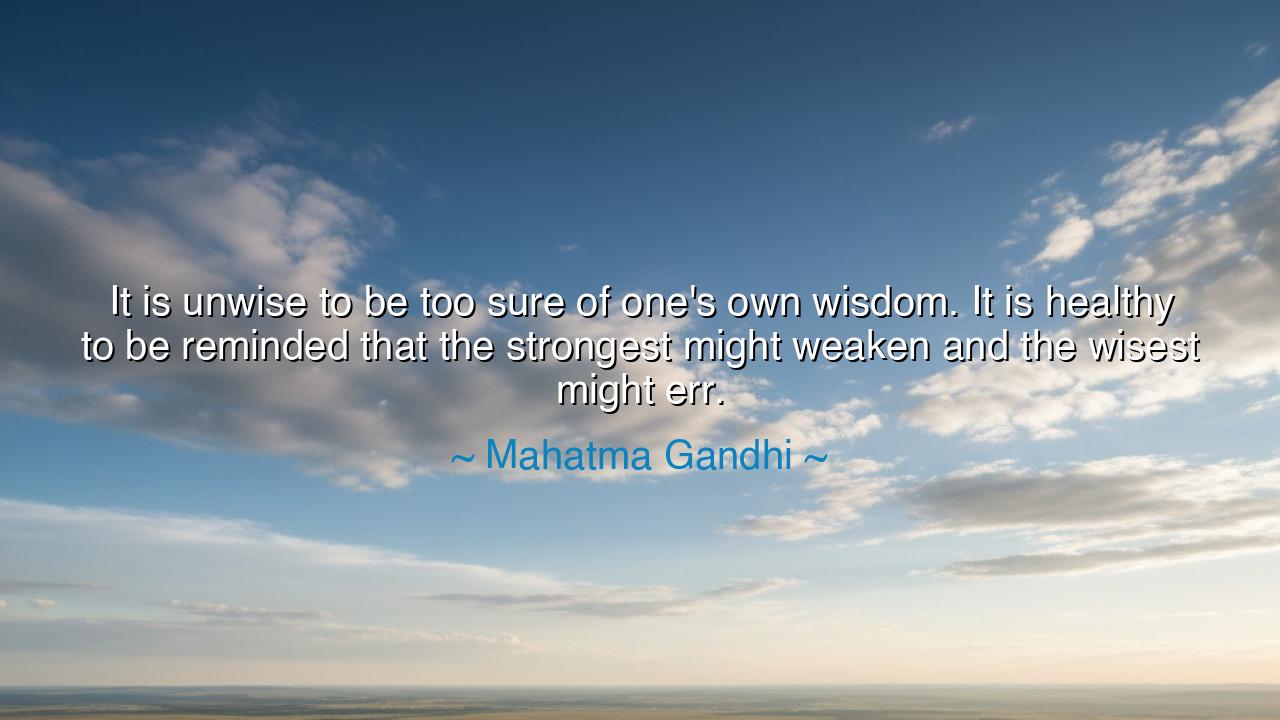
It is unwise to be too sure of one's own wisdom. It is healthy
It is unwise to be too sure of one's own wisdom. It is healthy to be reminded that the strongest might weaken and the wisest might err.






Hearken, O children of the ages, to the humble and profound words of Mahatma Gandhi, who speaks to the heart of true wisdom. He warns that “It is unwise to be too sure of one’s own wisdom,” for certainty breeds arrogance, and arrogance blinds the mind. True strength and true wisdom are not found in pride, but in humility—the recognition that even the greatest among us are fallible.
Gandhi reminds us that the strongest might weaken and the wisest might err. This is a universal truth woven into the very fabric of life. Strength, whether of body, mind, or spirit, is not unending. Even the mighty warrior may falter, and even the most enlightened sage may stumble into error. By acknowledging this, we guard ourselves against complacency and cultivate compassion toward the mistakes of others.
Consider the fall of the Roman Empire, which once seemed invincible. Rome, in its hubris, believed itself eternal and beyond weakness. Yet corruption, overconfidence, and internal decay brought even the strongest empire to its knees. Similarly, in personal life, countless leaders throughout history—kings, philosophers, generals—have fallen because they trusted too much in their own judgment, refusing to be guided or corrected. Their stories are lessons written in the blood of nations.
Gandhi himself lived by this teaching. Though revered as a leader of India’s independence, he often sought counsel from others and admitted when he erred. His philosophy of nonviolence was not born from rigid certainty, but from reflection, listening, and a willingness to grow. In this, he demonstrated that true greatness is not the absence of mistakes, but the humility to learn from them and rise renewed.
O children of the future, carry this teaching in your hearts: walk the path of humility, and do not cling too tightly to your own sense of being right. Seek counsel, be open to correction, and treat both strength and wisdom as gifts that must be tended, not thrones to be worshiped. For when you remember that even the mighty may fall and the wise may err, you protect yourself from pride and grow ever closer to the truth.
Thus Gandhi’s words ring through the ages as both warning and guide: that the highest wisdom lies not in claiming to be wise, but in knowing that we are always students in the vast school of life.






UUVDVIAS
This statement makes me question the balance between certainty and humility. Is it possible to be confident in one’s knowledge while remaining aware of potential errors? I feel that understanding human fallibility could prevent overconfidence and promote continuous learning. I’m curious about methods to cultivate this mindset—through reflection, mentorship, or exposure to diverse viewpoints. Could embracing our limitations be a key to both personal growth and effective leadership?
GKLe Gia Ky
Gandhi’s words prompt me to think about the social dynamics of wisdom. If everyone recognizes that the strongest might weaken and the wisest might err, how would it change accountability and collaboration? I wonder whether fostering environments where mistakes are acknowledged rather than punished could enhance collective intelligence. Could this perspective reduce arrogance and create more thoughtful, reflective communities where guidance comes from mutual support rather than rigid hierarchy?
TMhoang tuan minh
I find this statement both comforting and cautionary. It reminds me that no one is immune to mistakes, no matter how capable or knowledgeable they appear. I’m curious how this principle applies in high-stakes fields like medicine, law, or politics, where errors can have serious consequences. Does awareness of potential weakness improve judgment, or can it lead to hesitation and self-doubt? How do we maintain confidence while remaining open to correction?
AAVOCADO
This quote makes me reflect on the role of humility in personal growth. It suggests that acknowledging our limits is not weakness but a form of strength. I wonder whether modern culture, which often celebrates certainty and decisiveness, makes it harder for individuals to accept their errors. Could embracing the idea that even the wisest might err lead to more ethical decision-making and empathy in leadership and daily life?
TTLe thu trang
Reading this, I’m struck by Gandhi’s emphasis on humility and self-awareness. It makes me wonder how often people, including leaders, fall into the trap of overestimating their own wisdom. Can recognizing the fallibility of even the strongest and wisest help in decision-making and relationships? I’m curious about strategies to cultivate this awareness without undermining confidence, and how societies or organizations might encourage this balance between self-assurance and openness to correction.